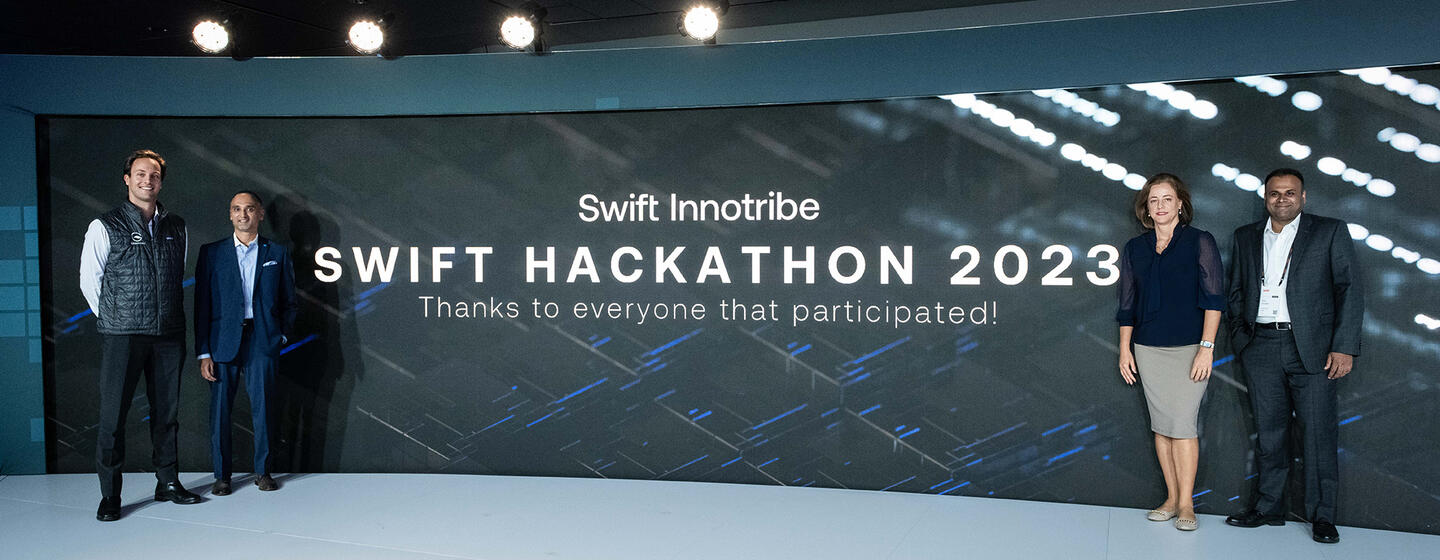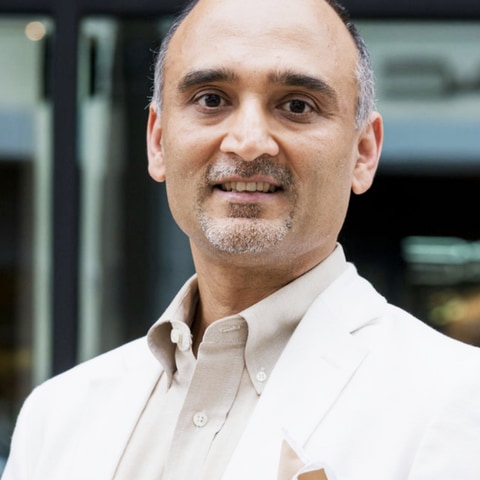IBM and Capgemini are this year’s Hackathon 2023 winners! We asked the winning teams how they tackled the Hackathon challenges, how they developed this year’s most innovative environmental, social and governance (ESG) solutions, and what they took away from the experience.
With a record number of entries, this year’s Hackathon was our most popular yet – with 37 companies and over 200 participants joining to offer their creative solutions to our two challenges. And deciding the winning teams was no easy task for our judges!
This year’s theme was ‘innovating for a sustainable future’ – a fast-moving and challenging space for the technology and financial services industries but one which offers incredible opportunities for innovative thinking. Hackathon 2023 participants were challenged to create solutions that either help institutions measure ESG impact, or transform how they report ESG compliance.
“I fundamentally believe that there are a lot of amazing people around the world trying to do the right thing, but without reliable data to support better decisions, they can't make the better choices,” says Hackathon judge, Melissa Sternberg, Global Head of ESG at Swift. "That’s why in this competition we set about unearthing solutions for ESG data measurement and compliance with the potential to be truly trusted by our community.”
“When it came to judging, we looked for answers to three key questions in the solutions proposed: How well does this solve the ESG problem? How innovative is the solution? And is the technology scalable?” says Sternberg. “And our Hackathon participants did not disappoint. The range of innovative and original solutions proposed by the teams demonstrated to us the real power of collaborative innovation to overcome some of the toughest challenges in sustainability.”
Congratulations to our winners, IBM and Capgemini, who both entered solutions with great potential to help the institutions to tackle the ESG data challenge. Congrats also to our runners up BNY Mellon and Greenomy, and a special mention to The Projective Group who ran their competitors extremely close in Challenge Two.
We spoke to both winning teams about their innovative solutions.
Challenge one winners: IBM
Objective: To better measure ESG impact within a business
Institutions are under increasing regulatory pressure to measure the ESG impact of their activities and operations. Without accurate measurements, companies will struggle to assess and make more sustainable business decisions in the future.
“Our financial clients have a lot of interest in ESG solutions. We have multiple assets and products that can be applied to this area. And we also have a personal interest in looking for solutions that help protect our planet,” says Ana Biazetti, Distinguished Engineer, Financial Services Cloud at IBM.
The first step on the road to success for IBM was bringing the brightest minds from around the company together, sharing product research and experience from across multiple teams.
At the start of the ideation process, the team brainstormed different business scenarios within the financial services industry that would benefit from an innovative solution to measuring ESG. After agreeing on a narrative, the team then combined different assets to create a business solution that reports on ESG across IT and hybrid cloud environments, identifying areas to reduce carbon footprint.
“Our focus was on organisations adopting a de facto standard hybrid cloud strategy. Our solution was two-fold: quantifying and qualifying the emissions from multiple IT assets; and empowering all stakeholders to take appropriate data-driven action,” says Balaji Viswanathan, Senior Software Engineer, IBM India.
After identifying gaps in the reporting infrastructure, the team integrated different AI-embedded products to demonstrate the complexity of ESG impact.
IBM found the experience rewarding and confidence-boosting.
“Winning the Hackathon reassures us that we’re headed along the right path to generate reports with embedded intelligence on energy usage and carbon emission status, as well as providing actionable insights. I think it underlines to our clients that they can trust us to keep track of, and improve, their ESG status,” says Yichong Yu, Solutions Architect, Financial Services Cloud, IBM.
Connecting with experts from different IBM teams across the globe was invaluable, but winning the Hackathon crown was “the cherry on top,” says Viswanathan. The experience helped the team not only to better understand the current status of ESG, but also to better consider challenges and solutions, and communicate them with their clients. “Whether you win or not, I would absolutely recommend this experience – we learned a lot,” adds Yu.
Industry-wide collaboration is key for modernising and streamlining business solutions that help preserve the environment and protect future generations. ESG, though broad and complex, is an exciting and important space. “Firms that perform strongly across all three factors of ESG outperform the market and generate more value in the long term,” concluded Biazetti.
Challenge two winners: Capgemini
Objective: To transform the accuracy, efficiency and transparency of ESG compliance
The ESG compliance landscape is constantly evolving. Regulations demand that businesses improve the accuracy, efficiency, and transparency of their ESG reporting. Understanding ESG as a domain, an area regulated by rules and governance, was critical to the winning team’s bid for Hackathon glory.
The winning team revealed that entering the Hackathon was an unmissable opportunity in breaking new ground in sustainability with Swift.
“We were one of the first companies to commit to net-zero. The focus has always been there from a company perspective; it’s part of our DNA, part of our culture,” says Vishal Jayanty, Senior Director, Global Insights and Data Practice, Capgemini.
Capgemini’s top-down agenda of simplicity, strategy and sustainability acted as a bedrock for the team to formulate its winning solution, drawing on knowledge and hands-on experience in data, insights, analytics and technology.
Leveraging an existing product, ESG Lens, the team made some tweaks and refinements, aligning the solution to two major problem statements. The first: the ESG space comprises myriad regulatory frameworks. The second: regulations are moving at a fast pace.
“Considering these problem statements, we asked, how can an organisation leverage unconventional data sources to respond to, or be ready for, regulations?” says Jayanty.
Incorporating sentiment analysis – distinguishing the positive from the negative within structured datasets – into the solution was crucial. Capgemini used native AI models to build historical context around numerous ESG aspects and the ever-changing speculations within the regulatory frameworks.
The semantics of ESG are important when contextualising the meaning of data.
“Once you have an accurate and comprehensive picture of ESG compliance,” says Jayanty, “you still need to present it in a way that people can comprehend.”
The team has also been looking at how to make ESG insights more consumable – Capgemini has the capability to provide these insights as a service through a centralised focus infrastructure.
For many organisations, sustainability approaches are still at a nascent stage, requiring ongoing improvement and adjustment to changing regulation. But, for Capgemini, technology plus data equals endless potential. And businesses embracing ESG solutions could see both near- and long-term rewards.
Capgemini’s solution can help the industry better comply with ESG requirements and maximise their sustainability strategies.
Getting the stamp of approval from the Hackathon judges was a tremendous confidence boost to the team. Asked if they would recommend the Hackathon experience to others in the industry, the team’s response was resolute: “absolutely”. And the challenge itself “was well articulated and resonated with everyone in the industry,” remarks Tej Vakta, Head, ESG Solutions Financial Services Insights & Data, Capgemini. “Customising an existing product only seemed apt considering the fundamentals of sustainability: reduce, reuse, recycle.”
Innovation doesn’t stop here
The Hackathon shows that innovation is constant and everywhere. Bright ideas don’t just come round but once a year. If you’re a bank, fintech or corporate, and you’d like to help with the sustainable transformation across our industry, we want to hear from you.




